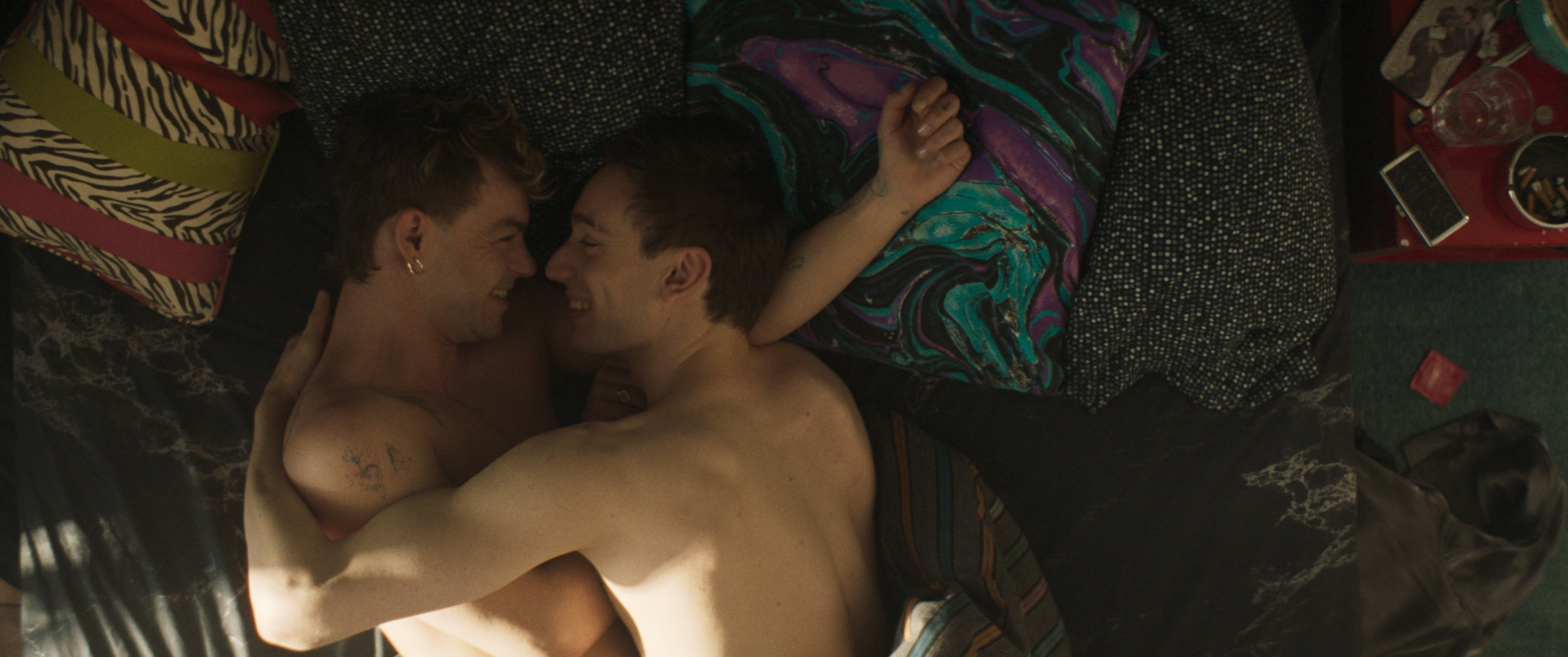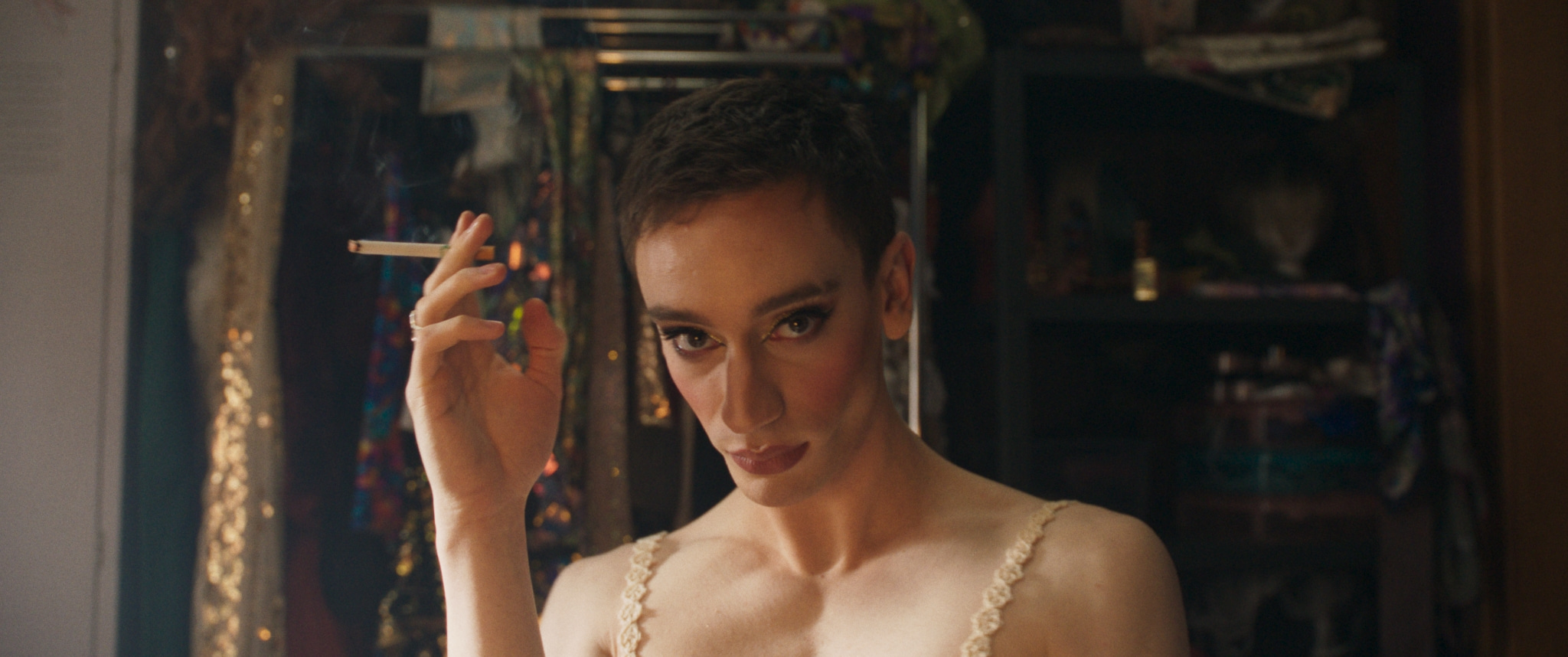Walk into the theatre purse first when viewing Solo. The French-language feature by Sophie Dupuis is a dazzling drag drama set in Montreal’s ballroom scene. Drenched in vivacious lighting, costumes that glitter and a soundtrack stacked with queer anthems, Solo invites audiences to enter an unabashedly queer space as it follows Simon (Théodore Pellerin) along his evolution as a drag artist.
The film, which has its world premiere on Sept. 10 as part of the Gala lineup at this year’s Toronto International Film Festival before opening in Canadian theatres this fall, marks the third collaboration between Dupuis and Pellerin. After 2018’s Family First (Chien de garde), which represented Canada in the Oscar race for Best International Feature, and 2020’s Underground (Souterrain), Solo also marks the Québécois duo’s own evolution as artists: cinematically, it’s a jolt of life. As Pellerin’s Simon struts the stage as his drag alter ego Glory Gore, Solo delivers a joyous character-driven portrait of a scene that invites people to live authentically without fear or judgment.
Pellerin works the runaway with confidence and grace as Simon comes into his own through drag. Glory Gore is an established queen when Solo begins, but Simon finds motivation for further transformation when smouldering queen Olivier (Félix Maritaud from BPM: Beats Per Minute) arrives from France. Sparks fly and Simon and Olivier form a duo both onstage and off. The pairing energizes Simon, but Olivier quickly consumes him both personally and professionally. At the same time, Simon’s estranged mother (Anne-Marie Cadieux), an internationally renowned opera singer whom he reveres, returns to Montreal with promises to reconnect. However, Simon finds himself caught in not one but two toxic relationships. He risks losing himself while trying to create a drag persona that he thinks will please others.
Dupuis, speaking with Xtra ahead of Solo’s TIFF premiere, says that she was long interested in setting a drama in the drag scene. It’s mostly coincidental that the portrait arrives at a moment in which the scene faces renewed hostility, particularly in the U.S.
“When we were shooting the film, we didn’t know what would happen with all those laws and protests around drag queens. We didn’t know that our film would be important in the political climate,” Dupuis says. The director says that drag queens inspired her through their capacity to master multiple art forms: makeup, fashion, dance and performance. “I was impressed by the liberty and the message their art tells not only to the crowd, but the society we live in. This form of art is necessary for questioning the norms of today.”
As Simon sashays through clubs and dance halls in crop tops and heels, Solo comfortably situates the performer amid an ensemble of queens and members of the LGBTQ2S+ community. Dupuis says that casting the ensemble informed the portrait of the ballroom scene that resonates so authentically on screen. “I surrounded myself with people not only from the community, but also people who know a lot about drag culture,” Dupuis says.
While Dupuis quickly cast Pellerin and Maritaud, the drag ensemble grew from intensive casting. “My auditions are very long, and we have the time to work and talk. All the drag artists who came in talked to me about their impression of what they read, gave me their approbation or said they recognized themselves in those characters.” The cast includes drag performer Marc-André Leclair, aka Tracy Trash, as Simon’s vivacious fellow performer Nicolas. “He’s been doing drag for 20 years and he is, I must say, one of the best in Montreal,” Dupuis says. “We were looking at him and getting his energy, asking questions, and he was very generous.”

Félix Maritaud and Pellerin in “Solo.” Credit: Courtesy of TIFF
While Solo situates Simon’s growth within a clearly defined chosen family, the film ultimately hinges on Pellerin’s performance. It’s a lively star-is-born turn in which one sees an actor fully come into his own. Pellerin says Dupuis involved him early during the script phase to get the character right. Over a year and a half prior to shooting, she sent Pellerin the script for his impressions and the character evolved with his perspective.
“It’s not the usual process of reading something that is finished, having an emotional reaction or connection to the character, and then developing the part based on that reaction,” Pellerin says. While he trusted the production team to take care of Simon’s lewks and dance moves, his feedback with Dupuis really sought to find the right dramatic arc for the character. “I never had a vision of Simon as something exterior, as something that I had to reach out to. The process made the part come from Sophie, and then from my input. It was like that with Underground as well.”

Director Sophie Dupuis. Credit: Eva Maude
“With all my actors, I’m choosing not only a talent or a face, I’m choosing someone to create with,” Dupuis says. “I’m asking my actors to rehearse a lot and bring new ideas, propose, deconstruct something, maybe brainstorm with me, and we rewrite.”
Pellerin, meanwhile, credits Dupuis for trusting him to explore the character and find himself in Simon. Connecting with a character who is a dazzling cocktail of poise and vulnerability calls on the actor to channel someone very different from the characters he’s played previously: his volatile wild child in Family First and a modest miner struggling with aphasia in Underground.
“Every project with Sophie has been an anchor moment for me as an actor, going back to my language and my accent and going back to a family which she is a part of, but with Family First, I was terrified of the violence that I had to embody. And in Underground, I was scared: I wanted to portray aphasia in the right way, and also the physical restrictiveness of it,” Pellerin says. “There’s an aspect of this character [Simon] that I haven’t reached in myself yet, and I had to learn to be able to give myself to this character. I think that Solo was allowing a femininity to come out or an easiness with femininity that I don’t think was ever a problem before, but more so than I thought.”
Pellerin says he didn’t approach Simon and Glory as different characters. It wasn’t just a matter of learning how to dance in heels. Pellerin had to discover the manner in which Simon composes himself in and out of drag. “For the everyday version of Simon, it took a while to find him,” Pellerin says. He adds that the process inspired him and Dupuis to interrogate how Simon plays with genre and gender while finding the right tools in costuming to bring out the character’s dimensions.
“At first, I thought he didn’t have to be feminine because he’s a drag queen and would want to go in the other direction in their everyday life. But when he goes out and he’s in a show mood, but not on stage, there’s still an element of play,” Pellerin says. “It became interesting to navigate what he would want his identity and his public persona to be outside of drag.”
Dupuis says she helped the actors harness the right element of play to their performance by enlisting Gerard X Reyes as choreographer. “He’s from the Kiki scene, the ballroom scene, and he helped my actors find their femininity, explore their bodies and learn to walk and dance in high heels, which is not easy. I can’t do it!” Dupuis says, laughing. “It was important for me that the drag characters of my actors come from them and their style and what they like.”
The dance numbers provide audiences with all the moves and tricks they’ve come to expect from nights at the club or weekends binge-watching Drag Race at home. But beyond the obligatory numbers set to ABBA’s “Voulez-Vous” and Donna Summer’s “Hot Stuff” to get audiences in the mood, the lip syncs and dances are key to character development in Solo. For example, when Simon and Olivier take the stage and deliver a sexually charged tag team to Hi Fashion’s “Amazing,” the song’s playful call-and-response style sets up the toxic push-and-pull competitiveness that quickly defines their relationship.
As with many backstage dramas, the performances ignite dramatic tension among the players in the wings. Pellerin displays remarkable shifts in consciousness as Simon finds himself overjoyed by the thrill of the stage one moment and then deflates when Olivier belittles him the next. Audiences may quickly recognize the sense of imposter syndrome and self-doubt that quickly fills Simon’s eyes. His brief interactions with his mother are equally joyous and torturous when it becomes clear that he’s little more than another item on her itinerary.
As Solo volleys back and forth between the dramas in Simon’s family both biological and chosen, the film explores relationships in which queerness is simply one facet of multiple dimensions. Dupuis says it was important to look at the ballroom scene without falling into the cliché of a coming out story or the search for acceptance. In Solo, Simon’s sexuality isn’t an issue or topic for conversation. His sister is his resident seamstress and his father and stepmother are among his biggest cheerleaders.
“I wanted to tell a story that could be anybody’s story: a love story, a family story, a chosen family story about community and love and individuality,” Dupuis says. “I wanted the queerness to be celebrated. So it’s not only tolerated, it’s celebrated.”
“I think we’re on the cusp of a sexual revolution.”
Moreover, Solo creates an aspirational context in which Simon and the other queens perform in an environment free of homophobia. Nobody hurls derogatory comments or beer bottles at them. Any conflict comes from the interpersonal dynamics of the main characters. “The identity is never the issue, which is certainly not representative of the realities of all queer people, but is of some today, like Gen Zs,” Pellerin says. “It’s so different from 20, 30 years ago. It’s incomparable, the place that queer people [now] have.”
“I was just writing a love story and a destructive love story between two men without it being problematic,” Dupuis says. “When I was making the film, we were talking a lot with actors, and my cast is mostly queer. The actors were telling me how they would have been happy to see that film when they were younger: to see themselves on screen and see a real love story between two men.”
Pellerin, meanwhile, finds the relationship between Simon and Olivier refreshing. He agrees that the production isn’t overtly political, but that it speaks to the current political climate by simply giving queer people space to be themselves and to create a revolution on the dancefloor.
“It’s great to have a film where the problematic is not the queerness of the characters and we are just exploring a love story. Drag and the queerness are the environment, but it’s not a social commentary on queer people and their place in society,” says Pellerin. “I think it’s great that we’re getting to a place where the characters are becoming real characters who aren’t always confronting their own sexuality—thank God. Of course, with all the laws that they are trying to pass in the States, drag and trans identity are extremely political. But I think we’re on the cusp of a sexual revolution where the norm is just something else completely. And maybe there is no norm. There’s going to be an uproar from the right and the far right to kill literally and figuratively that élan, that momentum of freedom. It’s terrifying to see so much hate, transphobia and homophobia, but at the same time, I think we’re on the right path to the revolution.”


 Why you can trust Xtra
Why you can trust Xtra


